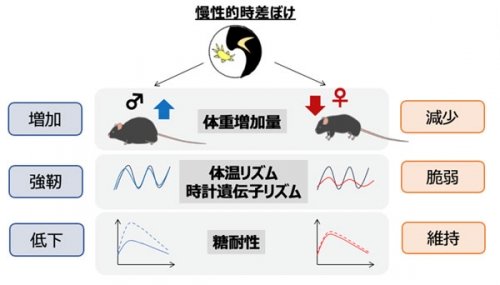Professor YASUO Shinobu and her research group have discovered that the circadian clocks in female mice are more vulnerable to chronic jet lag than those in male mice.
The findings highlight the importance of the health management of shift workers based on sex/gender differences
POINT
- It was previously unclear how sex/gender affects susceptibility to circadian rhythm disruptions in irregular light-dark environments.
- By using male and female mice, it is demonstrated that the circadian rhythms of females are more vulnerable to chronic jet lag than those of males. Additionally, there are significant sex differences in the effects on body weight and glucose tolerance, which are regulated by the circadian clock.
- The findings contribute to the development of appropriate sex/gender-dependent methods for the health management of shift workers and modern people who have irregular lifestyles.
SUMMARY
Humans have the circadian clock that derives approximately 24-hour cycles of biological rhythms, regulating daily fluctuations in sleep-wake cycles and physiological activities. It is known that irregular light-dark environments can disrupt the circadian clock, increasing the risk of diseases such as obesity and diabetes. However, due to the diversity in human dietary habits, exercise levels, and genetic factors, animal experiments with controlled environments and genetic backgrounds are needed to clarify the impact of light-dark environments on the circadian clock. Animal experiments investigating the susceptibility of the circadian clock and its association with metabolic disorders have primarily used males, with very few studies involving females. Consequently, the sex-dependent differences in susceptibility to circadian clock disruptions and their causes have remained unclear.
Professor YASUO Shinobu and Associate Professor IKEGAMI Keisuke from the Faculty of Agriculture at Kyushu University, with their research group, discovered that under "chronic jet lag conditions," where the light-dark cycle is frequently shifted to induce long-term jet lag in mice, the circadian rhythms of females are more easily disrupted than those of males. Additionally, while males exhibited excess weight gain and glucose intolerance under these conditions, females showed weight loss, indicating significant sex differences in the regulation of metabolic disorders. Furthermore, in castrated males, their circadian rhythms in core body temperature became vulnerable to jet lag, as observed in intact females. When testosterone replacement was performed in the castrated mice, their resilience on the circadian clock was restored. These data suggest that testosterone plays a key role in the male-specific response to chronic jet lag. These findings highlight the importance of considering sex/gender differences in the health management of individuals with irregular lifestyles, such as shift workers. It is anticipated that appropriate methods will be developed for health management based on the sex/gender differences in susceptibility to circadian clock disruptions.
These research findings were published in the British journal Biology of Sex Differences on Thursday, December 5, 2024 (Japan time).
Comment from the Researcher

Generally, it is known that "jet lag can lead to weight gain," but there is no consensus of the sex-dependency in the risk of obesity and diabetes among shift workers. In this study, the effects of chronic jet lag were investigated using male and female mice. It was revealed that the body weight gain in females decreased compared to the control group. In humans, it is expected that these biological effects are further complicated by factors such as diet and stress. Therefore, it is necessary to develop appropriate methods for management of circadian disruption via diet, nutrition, or exercise, based on the sex/gender differences.
Paper Information
Journal: Biology of Sex Differences
Title: Sex-dependent effects of chronic jet lag on circadian rhythm and metabolism in mice
Authors: Tiantian Ma, Ryohei Matsuo, Kaito Kurogi, Shunsuke Miyamoto, Tatsumi Morita, Marina Shinozuka, Fuka Taniguchi, Keisuke Ikegami, Shinobu Yasuo
DOI:10.1186/s13293-024-00679-z
For Research-related inquiries












 Contact
Contact
 Access Map
Access Map

